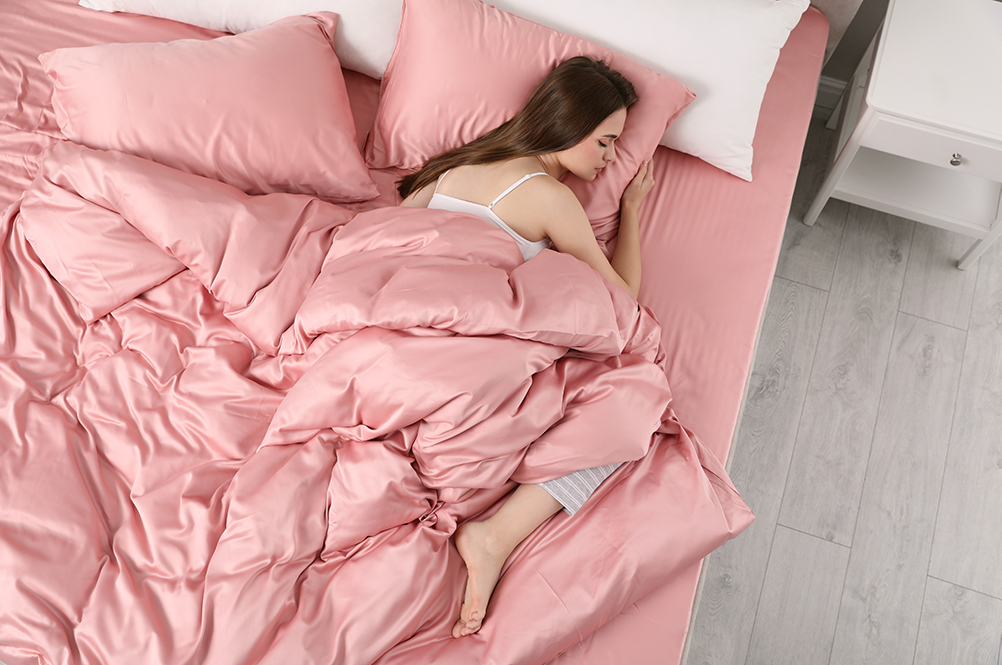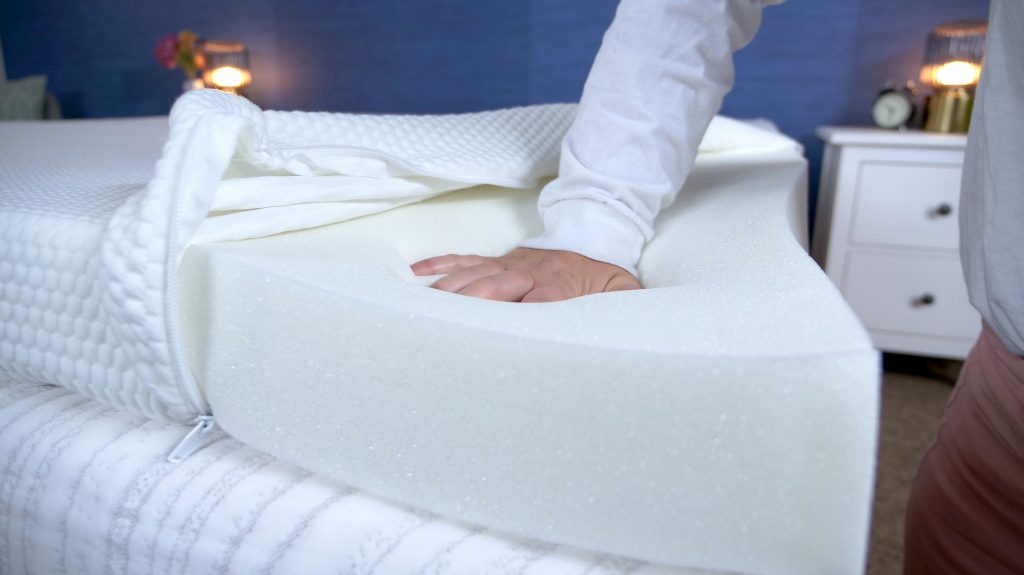
Sometimes, your bed that felt perfect when you first got it may start to feel too firm for comfort. Maybe your sleeping position and preferences change over time or your new mattress didn’t break in as much as you’d like and you’re past your sleep trial period. No matter the reason, you don’t need to start shopping for a new mattress yet — there are ways to make your mattress softer without replacing it.
In this article, we’ll show you a few tricks and tips to make your mattress softer and will help you figure out whether your firm mattress could be hurting your sleep quality.
How to Make Mattress Softer
Give It Time
If you’ve just gotten a new bed, it will likely get softer over time. Your bed will have a firmer feel at first, but usually will soften up after 30 to 60 days of sleeping on it. Memory foam beds generally take the longest to break in, but innerspring and latex beds will break in a little sooner. If you want to break in your bed faster, you can walk across your bed each day to help speed up the process. If your bed still feels too firm for you after 60 nights of sleeping on it, you might need to take some more steps to make your mattress softer.
Check Your Trial Period
If you’ve broken in your new mattress and it still doesn’t feel soft enough for comfort, you can return your bed if it’s within your sleep trial period. Sleep trial periods typically last between 30 and 365 days and allow you to return or exchange your bed for free or a low cost before the sleep trial period is over. If you’re still within your trial period, you can contact your mattress company to return your mattress for a refund or to swap it out for a softer model. You can also check out our favorite soft mattresses.
Buy a Mattress Topper
A mattress topper is an easy way to change the feel of your mattress. A mattress topper is a layer of foam that is one to three inches tall that is designed to sit on the surface of your mattress and underneath your mattress cover and sheets. Choosing a mattress topper made of plush, contouring materials, such as memory foam, polyfoam, wool, or latex, could help make your mattress feel softer. Take a look at our top mattress topper picks to find the best mattress topper for your bed.

Flip or Rotate Your Bed
When you sleep in the same spot on your bed night after night, the mattress can break down which changes the feel of your bed. You can try rotating your bed 180 degrees to see if the less worn areas of your bed feel softer and to your liking. You can also try flipping your mattress — but keep in mind that not all mattresses are flippable. Check with your mattress manufacturer to see if flipping your bed could help improve your sleeping experience.
Replace Your Bed Frame
If you’ve put your mattress on a solid platform base or bed frame, your mattress may feel firmer. Using a flat, firm foundation underneath your bed adds extra stability to your mattress, but also will make the mattress feel less soft and buoyant. Swapping a firm foundation out for one built with springs, like a box spring, will make your bed feel more bouncy and plush.
Increase the Temperature
Changes in temperature can alter the firmness level in certain mattress materials. If your bed was built with memory foam, it can contract under colder temperatures. When memory foam contracts, its plush surface feels more firm and sturdy. You can keep your bedroom at a warmer temperature or add a heating blanket to your bed to warm it up.
Switch up Your Sleep Position
Certain sleeping positions need a softer mattress than others. Side sleepers are most comfortable on a soft mattress that cradles their shoulders and hips as they press into the mattress. If you sleep on your side, you may want to train yourself to snooze in a back or stomach sleeping position. These two sleep positions are typically most comfortable on a medium or medium-firm mattress, so your firmer bed will be a better fit.
Buy a New Mattress
After you’ve tried all these steps, your mattress is past its sleep trial period, and your bed still feels too stiff for comfort, you might want to start looking for a new mattress. Fortunately, there are a wide variety of plush mattresses available to fit virtually any budget and sleep preferences — see our roundup of best soft mattresses.
It’s important for your health and well-being to have the right bed for your sleep needs so you can get a good night’s sleep. Keep reading for guidance to help you decide whether it’s time to throw in the towel and get a softer mattress.
How to Know if Mattress Is Too Firm
If you’re on the fence about replacing your mattress, there are a few signs you can look for that will tell you a softer bed is a must-have. Here’s how you’ll know that your current bed isn’t cutting it and is too firm for your sleep needs.
- Waking up in pain: When you wake up in the morning, you may feel like new aches and pains are popping up overnight. If this is the case, your bed is likely the wrong firmness level for you.
- Don’t feel cushioned around your joints: As you lie in bed, you may feel pressure around your knees, hips, shoulders, or other joints that tend to press into the mattress. A softer bed will help redistribute your weight evenly across the mattress to relieve stress from these joints.
- It’s uncomfortable: If you have trouble getting cozy enough to fall asleep and don’t enjoy curling up in bed at night, your bed may not be soft enough.
- You sleep better on softer mattresses at hotels or friends’ houses: If you’ve noticed that you get a full night’s sleep and wake up feeling more rested on more plush mattresses, you probably should start shopping for a softer bed.
What Happens When Mattress Is Too Firm
Sleeping on a mattress that is too firm could have negative short and long-term impacts on your quality of sleep and health. Initially, you’ll feel uncomfortable and will toss and turn, which means that your sleep will be compromised.
Over time, however, sleeping on a too-firm mattress could push your spine out of a healthy alignment while you sleep and cause back and neck pain. You’ll want to fix your mattress firmness as soon as you start feeling uncomfortable to avoid unnecessary sleep loss and back aches.
FAQs
What can you do if your mattress is too hard?
If your mattress is too hard, you should sleep on it for at least 30 to 60 days to make sure it is broken in. After that, you can add a mattress topper, choose a mattress foundation built with springs, increase the temperature of your bedroom, or switch up your sleeping position to sleep on your back or stomach to make your bed feel softer.
Is it better to sleep on a harder or softer mattress?
Generally, it is better to sleep on a softer mattress if you have a lighter body type, need more pressure relief, or sleep on your side. Those with larger body types and people who sleep on their backs and stomachs tend to prefer firmer mattresses. Mattress firmness is subjective, however, and it is best to sleep on whatever mattress firmness level provides you with the balance of support and comfort you need.
Do mattress toppers make beds softer?
Mattress toppers can make beds softer, but there are also mattress toppers available that will help make your bed firmer. There are lots of mattress options on the market to help meet a wide variety of sleep needs and preferences.
Is a hard mattress good for your back?
A supportive mattress is good for your back, but a mattress that is too firm can push your spine into an unhealthy posture and cause aches and pains.
Conclusion
If your mattress feels too firm, you’ll want to fix it to make sure you are comfortable enough to get the quality sleep you need to stay healthy. You can break in your bed, return your mattress if it’s within the trial period, or try the tricks we outlined above to soften up the feel of your bed. If you can’t get your mattress soft enough to get comfortable, check out our guide to the best soft mattresses to find a bed that will help you get your best night’s sleep.



























